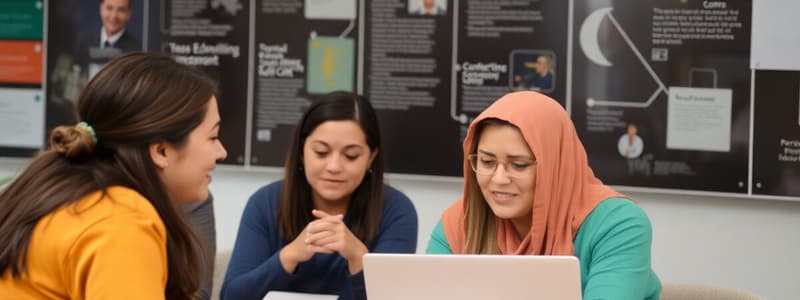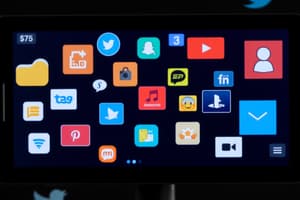Podcast
Questions and Answers
What is the primary goal of Media and Information Literacy?
What is the primary goal of Media and Information Literacy?
- To limit access to information sources.
- To promote passive consumption of media.
- To enable citizens to effectively engage with media and information. (correct)
- To provide citizens with entertainment options.
Which competency involves assessing credibility and accuracy of sources?
Which competency involves assessing credibility and accuracy of sources?
- Interacting with media creators.
- Creating and producing media.
- Evaluating sources. (correct)
- Accessing information.
Which of the following is NOT one of the competencies of Media and Information Literacy?
Which of the following is NOT one of the competencies of Media and Information Literacy?
- Understanding the organization of media systems.
- Applying information to daily life.
- Limiting access to information. (correct)
- Recognizing quality media sources.
How does Media and Information Literacy empower citizens?
How does Media and Information Literacy empower citizens?
What does the ability to create and produce media signify in Media and Information Literacy?
What does the ability to create and produce media signify in Media and Information Literacy?
What is one of the primary goals of media literacy?
What is one of the primary goals of media literacy?
How do media messages reflect the values of media makers?
How do media messages reflect the values of media makers?
What does the term 'language of persuasion' in media refer to?
What does the term 'language of persuasion' in media refer to?
What role do individuals play in media consumption according to media literacy concepts?
What role do individuals play in media consumption according to media literacy concepts?
What is the significance of recognizing bias and misinformation in media?
What is the significance of recognizing bias and misinformation in media?
What is the role of media literacy in education?
What is the role of media literacy in education?
What does the ability to 'understand media and information' involve?
What does the ability to 'understand media and information' involve?
Which of the following is NOT one of the roles of media and information?
Which of the following is NOT one of the roles of media and information?
How does media literacy contribute to democratic processes?
How does media literacy contribute to democratic processes?
What is meant by 'producing media and information'?
What is meant by 'producing media and information'?
Which statement best describes the concept of media as a government watchdog?
Which statement best describes the concept of media as a government watchdog?
What is a primary skill developed through media literacy?
What is a primary skill developed through media literacy?
What does 'accessing media and information' involve?
What does 'accessing media and information' involve?
Flashcards are hidden until you start studying
Study Notes
Media and Information Literacy
- Media and Information Literacy (MIL) equips individuals with skills to engage effectively with media and information systems.
- MIL aims to develop active and critical citizens who can participate in civic life and democracy.
MIL Competencies
- Accessing and locating suitable media and information sources.
- Using and understanding media and information for daily life applications.
- Evaluating the credibility, accuracy, and objectivity of sources.
- Creating and producing media and information.
- Participating in media and information creation by interacting with creators and editors.
- Understanding the workings of media and information systems, including their organization and information production methods.
- Recognizing, demanding, and defending quality media and information sources.
Roles of Media and Information
- Channels of information and knowledge.
- Facilitators of informed debates between diverse social actors.
- Sources of knowledge about the world beyond immediate experience.
- Resources for building society's understanding of itself and fostering community.
- Government watchdogs.
- Facilitators of public scrutiny of those in power.
- Promoters of accountability for maladministration and corporate wrongdoing.
- Essential facilitators of democratic processes, ensuring free and fair elections.
- Vehicles for cultural expression and cohesion within and between nations.
- Advocates and social actors while respecting pluralistic values.
Media Literacy
- A 21st-century approach to education emphasizing skills accessible to everyone.
- Enables individuals to access, analyze, evaluate, and create media messages across various formats.
Benefits of Media Literacy
- Understanding how media messages create meaning.
- Identifying the creators of media messages.
- Recognizing the intentions of media creators.
- Recognizing tools of persuasion used in media.
- Detecting bias, spin, misinformation, and lies in media.
- Evaluating media messages based on personal experiences, beliefs, and values.
- Creating and distributing personal media messages.
- Advocating for change in the media system.
Basic Media Literacy Concepts
- Media constructs our culture.
- Media messages influence thoughts, attitudes, and actions.
- Media utilizes persuasive language.
- Media constructs fantasy worlds.
- No single media source tells the whole story.
- Media messages contain texts and subtexts.
- Media messages reflect the values and viewpoints of media makers.
- Individuals construct their own meanings from media.
- Media messages can be decoded effectively by media-literate individuals who actively engage with and critically analyze content. This process of decoding involves recognizing the underlying messages, intentions, and impacts of various media forms. Information literacy not only entails the ability to locate and grasp content but also emphasizes critical evaluation of sources to discern quality and credibility, thus enabling informed decision-making. Meanwhile, technology literacy focuses on the adeptness required for using digital tools and platforms, which is essential for successful communication and efficient management of information in today's technology-driven landscape.
Studying That Suits You
Use AI to generate personalized quizzes and flashcards to suit your learning preferences.




